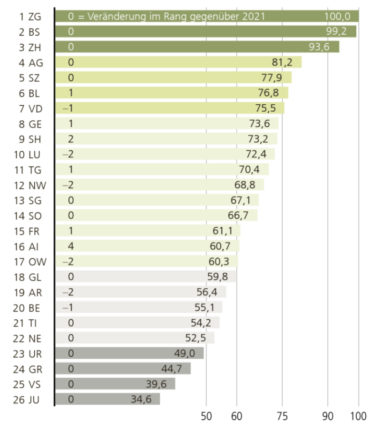Which Swiss cantons have the strongest economies?

A new study has revealed the most (and least) economically successful cantons in Switzerland but what does this mean for the residents?
Obviously, the more economically developed and financially stable a canton is, the more benefits it can provide to its residents, in terms of infrastructure and public services alike.
In this way, it becomes more ‘competitive’ than cantons whose coffers are not as full.
This year’s Cantonal Competitiveness Index (CCI), compiled by UBS bank and released last week, reveals quite a disparity among cantons.
“Economic structure, accessibility to services, and human capital make it possible to explain the relative economic power of the cantons,” said UBS economist Katharina Hofer.
READ ALSO: Which Swiss cantons offer most benefits to their residents?
What does the Index show?
For instance, Zug is ranked in the first place, which is not exactly surprising, as the tiny canton with (until now) Switzerland’s lowest tax rates, is an economic powerhouse: over 24,000 companies are registered on its 239-square kilometre territory (registered doesn’t mean the businesses are physically located in Zug, however; many just use a Zug address for tax purposes while being located elsewhere).
READ ALSO: Why does the canton of Zug have Switzerland's lowest taxes?
Basel-City is in the second place and Zurich in the third.
These cantons are followed by Aargau, Schwyz, Basel-Country, Vaud, Geneva, Schaffhausen, and Lucerne, making up the top 10.
On the other hand, Jura, Valais, Graubünden, and Uri are in the bottom four, meaning their prospects of competing with other cantons in terms of attracting residents and businesses alike are much weaker.
This UBS chart shows how the cantons are rated in terms of their economic prowess. Dark green means an ‘excellent’ potential; light green a ‘good’ potential; and the lightest one signifies a ‘solid’ potential.
Light grey areas designate a ‘moderate’ potential and dark ones ‘weak.’

Image: UBS media
Housing and taxes
UBS analysis indicates that several factors determine how competitive (or not) a canton is.
In comparison to previous year’s ICC, factors such as job market and higher prices have been taken into account.
Also, while previously cantons competed with each other on taxation, “inter-cantonal tax competition is losing its importance due to the acceptance of the minimum taxation of corporate profits," Hofer pointed out.
She was referring to a referendum held in June, when 78.5 percent of Swiss voters accepted to follow an international agreement, led by the Organisation for Economic Cooperation and Development (OECD), which calls for a global minimum 15 percent tax rate on multinationals.
Until now, many cantons — like Zug — have imposed some of the lowest corporate tax rates in the world (far below the new 15-percent threshold), in what they often said was needed to attract businesses in the face of high wages and location costs.
The Swiss government will begin imposing the new tax in 2024, estimating that additional revenues could amount to between 1.0 and 2.5 billion Swiss francs in the first year alone.
However, "cantons with formerly low income will be becoming less attractive for the companies compared to cantons with higher corporation tax," Hofer said, which means that not year ICC could reveal different results.
(However, this move concerns only corporate taxes; personal taxation rates will not budge upward).
Two other factors are shortage of skilled personnel and affordable housing in many cantons — and they are inter-related, Hofer said.
For employment to develop, affordable housing must be available, which is not the case in many regions of Switzerland.
"The interaction of these three factors translates into improved growth prospects" for many of the ‘weaker’ cantons, she said.
Comments
See Also
Obviously, the more economically developed and financially stable a canton is, the more benefits it can provide to its residents, in terms of infrastructure and public services alike.
In this way, it becomes more ‘competitive’ than cantons whose coffers are not as full.
This year’s Cantonal Competitiveness Index (CCI), compiled by UBS bank and released last week, reveals quite a disparity among cantons.
“Economic structure, accessibility to services, and human capital make it possible to explain the relative economic power of the cantons,” said UBS economist Katharina Hofer.
READ ALSO: Which Swiss cantons offer most benefits to their residents?
What does the Index show?
For instance, Zug is ranked in the first place, which is not exactly surprising, as the tiny canton with (until now) Switzerland’s lowest tax rates, is an economic powerhouse: over 24,000 companies are registered on its 239-square kilometre territory (registered doesn’t mean the businesses are physically located in Zug, however; many just use a Zug address for tax purposes while being located elsewhere).
READ ALSO: Why does the canton of Zug have Switzerland's lowest taxes?
Basel-City is in the second place and Zurich in the third.
These cantons are followed by Aargau, Schwyz, Basel-Country, Vaud, Geneva, Schaffhausen, and Lucerne, making up the top 10.
On the other hand, Jura, Valais, Graubünden, and Uri are in the bottom four, meaning their prospects of competing with other cantons in terms of attracting residents and businesses alike are much weaker.
This UBS chart shows how the cantons are rated in terms of their economic prowess. Dark green means an ‘excellent’ potential; light green a ‘good’ potential; and the lightest one signifies a ‘solid’ potential.
Light grey areas designate a ‘moderate’ potential and dark ones ‘weak.’

Housing and taxes
UBS analysis indicates that several factors determine how competitive (or not) a canton is.
In comparison to previous year’s ICC, factors such as job market and higher prices have been taken into account.
Also, while previously cantons competed with each other on taxation, “inter-cantonal tax competition is losing its importance due to the acceptance of the minimum taxation of corporate profits," Hofer pointed out.
She was referring to a referendum held in June, when 78.5 percent of Swiss voters accepted to follow an international agreement, led by the Organisation for Economic Cooperation and Development (OECD), which calls for a global minimum 15 percent tax rate on multinationals.
Until now, many cantons — like Zug — have imposed some of the lowest corporate tax rates in the world (far below the new 15-percent threshold), in what they often said was needed to attract businesses in the face of high wages and location costs.
The Swiss government will begin imposing the new tax in 2024, estimating that additional revenues could amount to between 1.0 and 2.5 billion Swiss francs in the first year alone.
However, "cantons with formerly low income will be becoming less attractive for the companies compared to cantons with higher corporation tax," Hofer said, which means that not year ICC could reveal different results.
(However, this move concerns only corporate taxes; personal taxation rates will not budge upward).
Two other factors are shortage of skilled personnel and affordable housing in many cantons — and they are inter-related, Hofer said.
For employment to develop, affordable housing must be available, which is not the case in many regions of Switzerland.
"The interaction of these three factors translates into improved growth prospects" for many of the ‘weaker’ cantons, she said.
Join the conversation in our comments section below. Share your own views and experience and if you have a question or suggestion for our journalists then email us at [email protected].
Please keep comments civil, constructive and on topic – and make sure to read our terms of use before getting involved.
Please log in here to leave a comment.